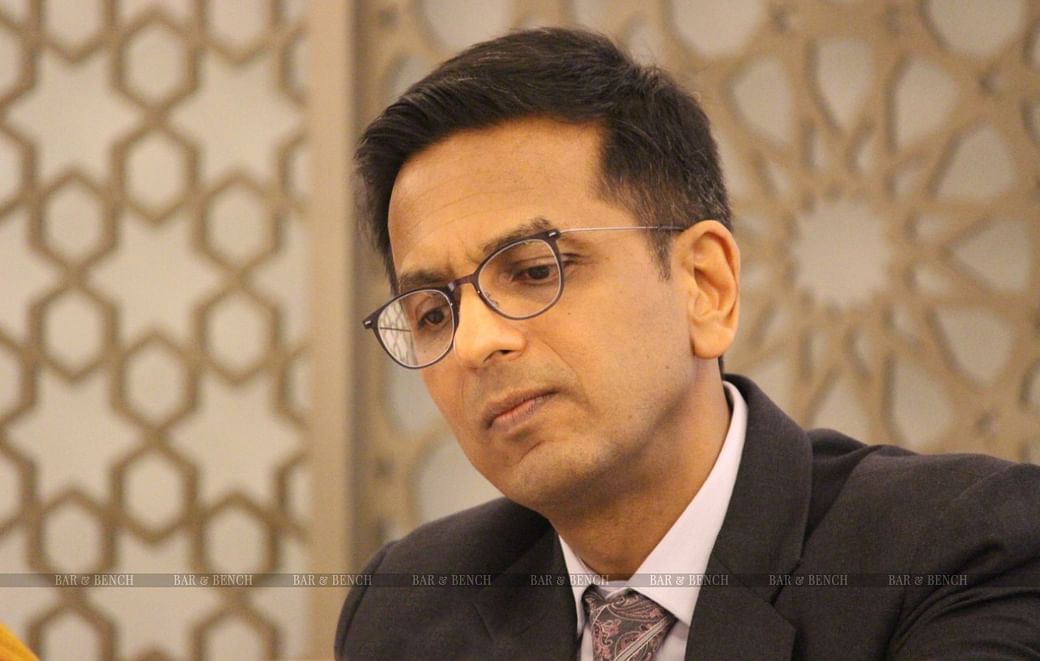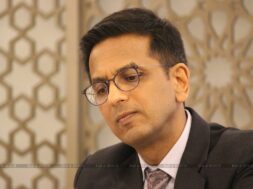
“Every Citizen Should Have the Power to Question the Sate to Determine Truth:” SC Judge
Manas Dasgupta
NEW DELHI, Aug 28: The Supreme Court judge Justice D Y Chandrachud, while speaking at a virtual event on Saturday said totalitarian governments are associated with a “constant reliance on falsehoods” and it was the duty of citizens to strengthen public institutions and always question the State to determine the truth.
While delivering a talk on the topic “Speaking Truth to Power: Citizens and the Law” as a part of the 6th MC Chagla Memorial Online Lecture, Justice Chandrachud said speaking truth to power was a right that every citizen must have in a democracy but equally it was duty of every citizen also,
Public intellectuals have “a duty to expose the lies of the State,” he said stressing that in a democratic country it is important to hold governments in check and guard against falsehoods, false narratives and fake news.
The right to speak truth to power by the citizens is integral to the functioning of a modern democracy, he said, adding, one cannot rely solely on the State to determine the truth but citizens must remain more vigilant and participate more actively in the process.
“Speaking truth to power” refers to an act by a speaker to use truth to criticise someone who is more powerful, Justice Chandrachud said. This act aims to uphold the right to hold truth to power with the assumption being that truth will counteract power and obviate a predisposition to tyranny, he added.
“Democracy and truth go hand in hand. Democracy needs truth to survive,” he said.
Justice Chandrachud also cautioned against an over-reliance on the government to provide social, political, economic, cultural and, in the current context, medical truths and highlighted the importance of a “press that is free from influence of any kind… political or economic” to ensure that governments could truly be held to account for actions and policies.
“One cannot rely only on the State for truth. Totalitarian governments are known for their constant reliance on falsehoods to consolidate power… we see there is an increasing trend among countries around the world to manipulate COVID-19 data,” Justice Chandrachud said.
Justice Chandrachud, however, said totalitarian governments are associated with a “constant reliance on falsehoods in order to establish dominance” and public intellectuals have a duty to question the state to determine the truth.
“It can’t be said that State will not indulge in falsehood for political reasons even in democracies. The role of US in the Vietnam War did not see the daylight until the Pentagon papers were published. In context of Covid, we see that there is an increasing trend of countries across the world trying to manipulate data. Hence, one cannot only rely on the state to determine the truth,” he said.
His remarks have been viewed against the backdrop of concerns expressed by experts, activists and journalists that governments may have fudged Covid data to hide the true spread of infections.
“The phenomenon of fake news is on the rise. The WHO (World Health Organization) recognized this during the COVID pandemic… calling it ‘infodemic’. Human beings have a tendency to get attracted to sensational news… which are often based on falsehoods,” he explained.
As early as February last year – when the pandemic was beginning to spread throughout the world – the WHO warned of a wave of fake news and misinformation emerging on social media, including “deliberate attempts to disseminate wrong information.”
Justice Chandrachud acknowledged that social media platforms like Twitter and Facebook should be held responsible for false content, but said people should be vigilant and, crucially, be open to reading about, debating and, perhaps, even accepting different opinions.
He spoke about a “post-truth” world, in which “there is a contest between ‘our truth’ vs ‘your truth’, and a tendency to ignore a ‘truth’ not in alignment with one’s perception.”
“We live in a post-truth world. Social media platforms are responsible… but citizens are also responsible. We incline towards echo chambers and don’t like opposing beliefs… we live in a world that is increasingly divided along social, economic and religious lines,” he said.
“We only read newspapers that align with our beliefs… we ignore books written by people who do not belong to our stream… we mute the TV when someone has a different opinion… we do not truly care about the ‘truth’ as much as we do about being ‘right’,” Justice Chandrachud explained.
“To counter fake news we need to strengthen our public institutions. We must ensure that we have a press that is free from influence of any kind… political or economic. We need a press that will provide us information in an unbiased manner,” he added.
Justice Chandrachud also called for a positive atmosphere in schools and colleges – one in which “students can learn to differentiate truth from falsehood (and) question those in power.” He also urged people to be kinder and more sensitive to those around them, saying, “We should not be quick to judge others for their opinions. We need to remove barriers based on gender, caste, religion, language or economic status.”













